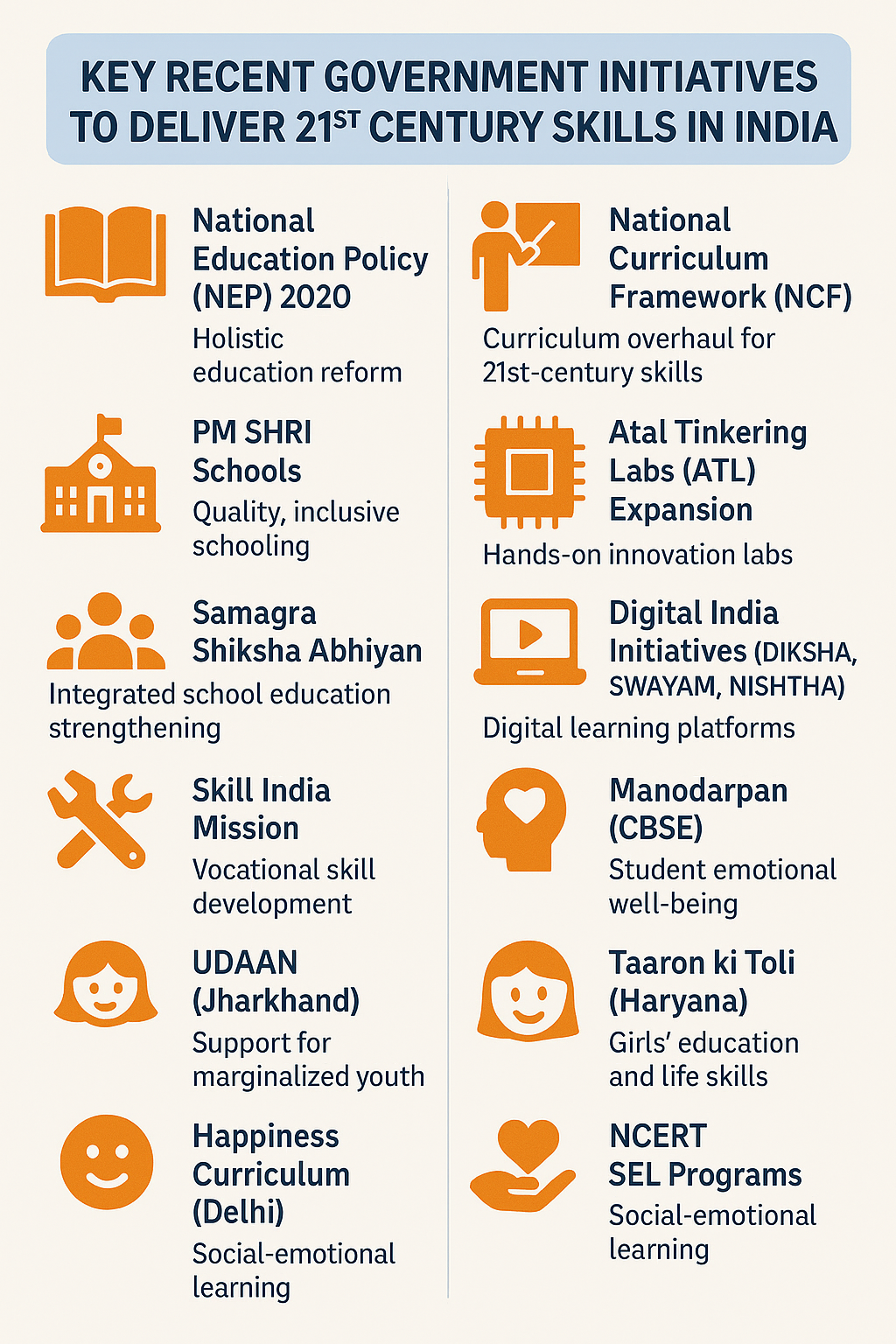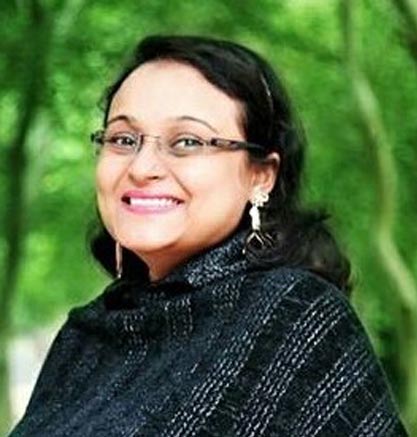-
CENTRES
Progammes & Centres
Location
As global labour markets and technology disrupt traditional pathways to success, can India ensure that every youth truly benefits from 21st-century skill development?

Image Source: Getty Images
On International Youth Day 2025, as the world celebrates the promise and energy of young people, India stands at a critical juncture. Home to the world’s largest youth population, India’s demographic dividend presents immense potential for the country's economic and social transformation. However, this window of opportunity is limited: India’s demographic dividend is expected to start shrinking in merely 33 years. Therefore, to leverage its young workforce before it begins to age, India must address the impending ‘ingenuity gap’ and equip its youth with a robust portfolio of 21st-century skills ancillary to core academic knowledge. 21st-century skills encompass employability and transferable job-relevant competencies, which are now globally recognised as essential investments in preparing the workforce to thrive in a rapidly changing, technology-driven, and interconnected world.
India’s challenge is not merely about creating more jobs but about better equipping youth for the jobs of the future. The 2025 India Skills Report reveals that only 54.8 percent of young Indians are considered employable, with many lacking adequate digital fluency, adaptability, and soft skills needed to succeed in the workplace. Beyond technical knowledge, employers now seek analytical, self-management, and leadership skills - all falling under the 21st-century skill umbrella.
India’s challenge is not merely about creating more jobs but about better equipping youth for the jobs of the future.
Rapid advances in Artificial Intelligence (AI), automation, and data analytics are also rendering many traditional skills obsolete. According to the Future of Jobs Report 2025, nearly 39 percent of the current workforce's skills are set to become redundant/outdated by 2030. As automation accelerates, skills such as AI and machine learning, data analytics, and environmental literacy will be crucial for determining employability. India’s youth must prepare not just for the existing assortment of jobs, but for emerging ones in green energy, fintech, health tech, and global services.
The Economic Survey of India 2024–25 highlights that for every rupee invested in social and emotional learning, there is a long-term economic return of INR11, with benefits extending across mental health, educational achievement, and employability. Global studies by the World Bank and OECD (Organization for Economic Co-operation and Development) highlight that individuals with strong 21st-century skills tend to have better life outcomes, including higher employment rates, improved performance, increased earnings, and greater adaptability in the workplace. Moreover, a robust skill ecosystem that nurtures creativity, design thinking, and human-centred problem-solving is essential for fostering grassroots innovation and regional equity. Enabled youth can be the drivers of frugal, context-specific solutions to India’s developmental challenges.
Enabled youth can be the drivers of frugal, context-specific solutions to India’s developmental challenges.
Recognising the need for holistic, multi-disciplinary education, the National Education Policy (NEP) 2020 envisions an education system aligned with ‘the aspirational goals of the 21st century.’ Furthermore, initiatives such as the National Curriculum Framework (NCF) 2023, Pradhan Mantri SHRI Schools, Atal Tinkering Labs (ATLs), and Digital India initiatives (see figure 1 for details).
Figure 1: Key Recent Government Initiatives to Deliver 21st Century Skills in India

Source: Prepared by author, using AI tools
At the school level, the Central Board of Secondary Education (CBSE) integrates a core set of 21st-century skill domains to provide a strong foundation for students’ future readiness with the following core domains :
However, it is essential to maintain agility in developing these skills, as their relevance and specific manifestations continually evolve in response to societal and technological advancements. Additionally, 21st-century skills are inherently interconnected—each skill supports, overlaps with, and enhances the others. Therefore, they form a dynamic, mutually reinforcing set that learners must continually update, refine, and apply across varied and often unpredictable real-world contexts.
Despite the progress made, particularly since NEP, at least seven key challenges remain.
To transform India’s demographic dividend into an inclusive, sustainable advantage, India must embed 21st-century skills within existing subjects and contextually reinforce them across the curriculum. A clear, grade-wise progression rubric should be designed to track and support students' development in these competencies, allowing for continuity and consistency in student learning trajectories. National institutions such as CBSE and National Council of Educational Research and Training (NCERT) play an important role in contextualising internationally recognised frameworks such as the Collaborative for Academic, Social, and Emotional Learning (CASEL) or United Nations Educational, Scientific, and Cultural Organisation Social and Emotional Learning (UNESCO SEL) frameworks and develop age-appropriate curriculum and assessment tools to assess 21st-century competencies.
There is a need to expand high-quality teacher training through platforms such as NISHTHA, PM eVidya, and SWAYAM. These trainings should be conducted in a blended mode, extending beyond one-time sessions and focusing on practical strategies and interactive pedagogies for teaching 21st-century skills in classrooms. These platforms should provide young students with self-paced and microlearning modules on diverse 21st-century skills such as communication, decision-making, and critical thinking to improve access among students.
To address measurement gaps, India must invest in a phased, multi-tiered framework for measuring 21st-century skills. A central dashboard could be developed to track the implementation of 21st-century skills outcomes at the state level, linking it to UDISE+ or PARAKH (Performance Assessment, Review, and Analysis of Knowledge for Holistic Development).
India needs a skilled workforce—youth who are not just degree holders, but also ethical innovators, empathetic leaders, and digitally confident problem-solvers.
In order to make 21st-century skills integration not just restricted to urban or high-resource schools, there is a need to find low-cost, scalable models of delivery. Models such as peer-led learning clubs, community volunteer training, offline digital content, and mobile-first EdTech platforms have the potential to fill infrastructure gaps as well as teacher availability gaps, particularly in underserved and rural areas.
Parental awareness can be enhanced through anganwadi networks, parent-teacher meetings, and community radio. Additionally, initiatives can be integrated with existing campaigns such as Poshan Abhiyan and Samagra Shiksha. Partnerships between industry and academia can play a pivotal role in accelerating the adoption of 21st-century skills by aligning curricula with real-world demands and providing mentorship, internships, and practical exposure. EdTech firms, Corporate social responsibility programmes, and non-profits can offer good pilot projects and scalable innovations in skill-building, which can be adapted for scalability.
International Youth Day serves as a reminder that the future of nations resides in the hopes, abilities, and actions of their youth. For India, the challenge ahead is clear: move beyond narrow academic metrics toward a holistic, skill-based, future-ready education system. India needs a skilled workforce—youth who are not just degree holders, but also ethical innovators, empathetic leaders, and digitally confident problem-solvers.
Arpan Tulsyan is a Senior Fellow at the Centre for New Economic Diplomacy, Observer Research Foundation.
The views expressed above belong to the author(s). ORF research and analyses now available on Telegram! Click here to access our curated content — blogs, longforms and interviews.

Arpan Tulsyan is a Senior Fellow at ORF’s Centre for New Economic Diplomacy (CNED). With 16 years of experience in development research and policy advocacy, Arpan ...
Read More +